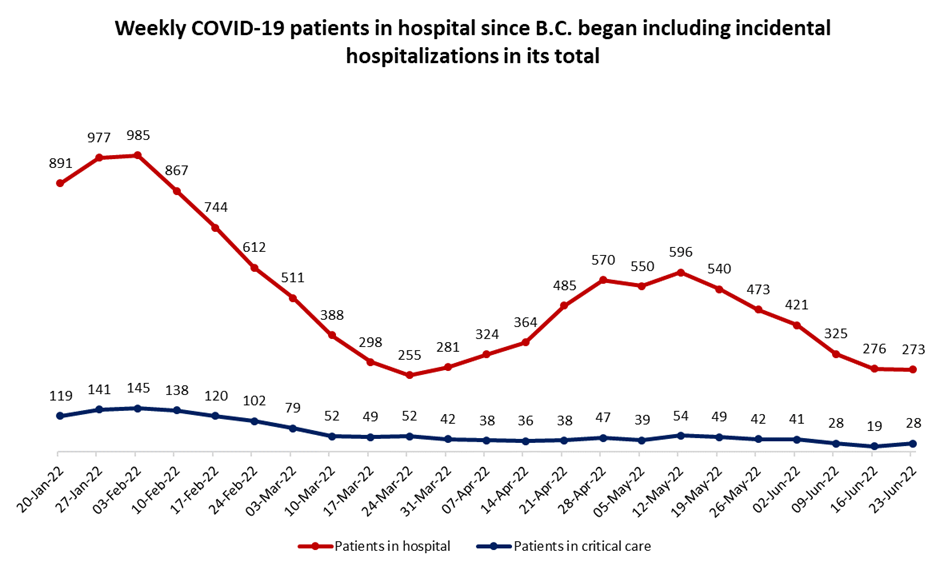273 people in B.C. hospitals with COVID-19 this week as decline slows
 Courtesy: Shutterstock.
Courtesy: Shutterstock.
There were 273 people with COVID-19 in B.C. hospitals Thursday, a total essentially unchanged from last week.
After several weeks of substantial declines in hospitalization numbers, the latest data from the B.C. Centre for Disease Control suggests the number of people in hospital with COVID-19 in the province may be stabilizing.
 This graph shows the number of COVID-positive patients in hospital on Thursdays since the BCCDC switched to counting incidental hospitalizations in January 2022. (CTV)
This graph shows the number of COVID-positive patients in hospital on Thursdays since the BCCDC switched to counting incidental hospitalizations in January 2022. (CTV)
The BCCDC includes both those who have severe cases of COVID-19 requiring hospitalization and those who are admitted to hospitals for other reasons and test positive incidentally in its weekly count.
Since the province switched to this "hospital census" model in January, the number of patients in hospital on a Thursday has been as high as 985 and as low as 255.
Included in Thursday's total hospitalizations are 28 COVID-positive people who are receiving critical care.
NEW CASES
The numbers of patients in B.C. hospitals and critical care units are the only two data points the BCCDC releases in real time each week. All other data is released based on the most recent "epidemiological week," in this case, June 12 to 18.
During that time period, the number of lab tests for COVID-19 that came back positive declined from the previous week, according to the BCCDC's latest weekly report.
There were 642 new lab-confirmed cases of COVID-19 in B.C. during the week of June 12 to 18, down from 726 between June 5 and 11.
Those figures include only publicly funded PCR test results, however. They do not account for positive at-home rapid antigen tests, which are the only testing method available to the vast majority of B.C. residents with COVID symptoms.
Because the data is nearly a week old and does not attempt to encompass the entire population, it's hard to say whether the continued decline in new cases reflects a continued decline in coronavirus transmission in B.C.
WASTEWATER
Wastewater data from the Lower Mainland can help estimate the transmission trend, though it too is limited by the epidemiological week timeline, as well as the fact that it only accounts for about 50 per cent of the provincial population.
In its latest weekly "situation report," the BCCDC notes that, "generally, viral loads detected at (Vancouver Coastal Health) wastewater treatment plants are decreasing, while there are minimal/modest increases at (Fraser Health) wastewater treatment plants" as of June 18.
Coronavirus concentrations in wastewater have declined 56 per cent over the last three weeks at the Iona Island plant, 67 per cent over the last five weeks at the Lions Gate plant, and 10 per cent over the last week at the Lulu Island plant.
In Fraser Health, viral loads at the Annacis Island plant have stabilized after seven weeks of declines. At the Northwest Langley plant, they've stabilized after six weeks of declines.
This information, coupled with the continued decline in test-positive cases and the essentially flat hospital census, suggests B.C. may be approaching the end of its post-sixth-wave drop in coronavirus transmission.
Whether that drop is followed by increasing transmission and a seventh wave or relatively stable levels of transmission for a while remains to be seen.
Provincial health officer Dr. Bonnie Henry has predicted that B.C. will see another spike in COVID-19 cases in the fall, but said she does not expect to reintroduce public health orders to control the spread when that happens.
NEW DEATHS AND HOSPITALIZATIONS
Along with the weekly case count, the BCCDC releases figures on new hospitalizations and new deaths by epidemiological week each Thursday.
This week, the centre reported 156 new hospital admissions and 26 new deaths from June 12 to 18. The BCCDC expects both of those numbers to increase, however, "as data become more complete."
Notably, the deaths reported each week since April 2 automatically include everyone who dies within 30 days of a positive test for COVID-19, before the underlying cause of death is known.
The province's Vital Statistics agency then determines the underlying cause of death after the fact, a process that can take eight weeks.
Since the switch to this method of counting – referred to as "30-day, all-cause mortality" – Vital Statistics has determined the underlying cause of nearly 500 deaths, and about 45 per cent of them have been attributed to COVID-19, with the rest attributed to other causes.
If 45 per cent of the 26 deaths reported for the week of June 12 to 18 end up being COVID-caused, the final tally for the week will end up being roughly 12 COVID-caused deaths, or about 1.7 deaths per day.
VACCINATION DATA
The province administered 55,156 new doses of COVID-19 vaccines during the week of June 12 to 18, with a large majority of that total going to fourth doses for seniors ages 70 and older.
A total of 45,387 fourth doses were administered, or roughly 82 per cent of the total for the week.
Another 6,155 were third doses, meaning just 3,614 doses – or roughly 6.5 per cent of the total – were administered as part of an initial course of vaccination.
As has been the case for months, roughly 91 per cent of B.C. residents ages five and older have had at least one shot, and 88 per cent have had two.
Sixty-one per cent of adults have received at least one booster dose, and 33 per cent of people ages 70 and older have now had a fourth shot, according to the BCCDC.
CTVNews.ca Top Stories

Young people 'tortured' if stolen vehicle operations fail, Montreal police tell MPs
One day after a Montreal police officer fired gunshots at a suspect in a stolen vehicle, senior officers were telling parliamentarians that organized crime groups are recruiting people as young as 15 in the city to steal cars so that they can be shipped overseas.
Mandisa, Grammy award-winning 'American Idol' alum, dead at 47
Soulful gospel artist Mandisa, a Grammy-winning singer who got her start as a contestant on 'American Idol' in 2006, has died, according to a statement on her verified social media. She was 47.
Man sets self on fire outside New York court where Trump trial underway
A man set himself on fire on Friday outside the New York courthouse where Donald Trump's historic hush-money trial was taking place as jury selection wrapped up, but officials said he did not appear to have been targeting Trump.
Sask. father found guilty of withholding daughter to prevent her from getting COVID-19 vaccine
Michael Gordon Jackson, a Saskatchewan man accused of abducting his daughter to prevent her from getting a COVID-19 vaccine, has been found guilty for contravention of a custody order.
She set out to find a husband in a year. Then she matched with a guy on a dating app on the other side of the world
Scottish comedian Samantha Hannah was working on a comedy show about finding a husband when Toby Hunter came into her life. What happened next surprised them both.
Shivering for health: The myths and truths of ice baths explained
In a climate of social media-endorsed wellness rituals, plunging into cold water has promised to aid muscle recovery, enhance mental health and support immune system function. But the evidence of such benefits sits on thin ice, according to researchers.
'It could be catastrophic': Woman says natural supplement contained hidden painkiller drug
A Manitoba woman thought she found a miracle natural supplement, but said a hidden ingredient wreaked havoc on her health.
'It was joy': Trapped B.C. orca calf eats seal meat, putting rescue on hold
A rescue operation for an orca calf trapped in a remote tidal lagoon off Vancouver Island has been put on hold after it started eating seal meat thrown in the water for what is believed to be the first time.
Manitoba mom praises quick-thinking fire department for freeing daughter stuck in playground equipment
A Manitoba mother is praising firefighters for their quick work in helping her daughter who got stuck at a playground in Lorette, Man.































